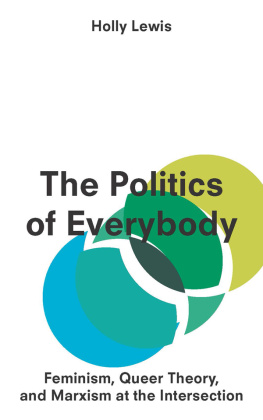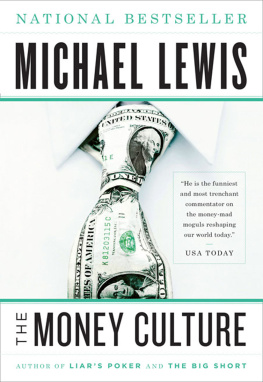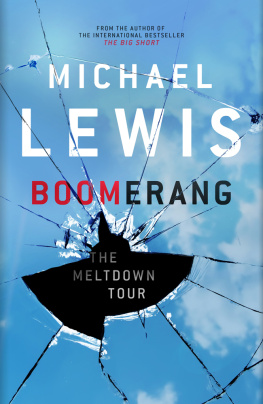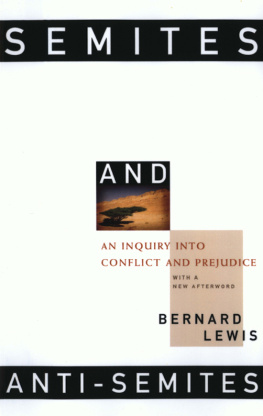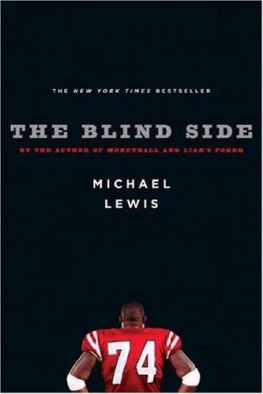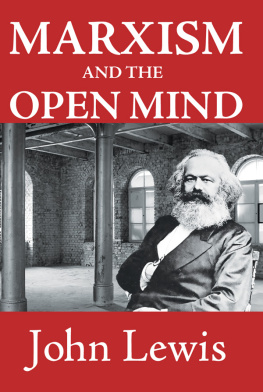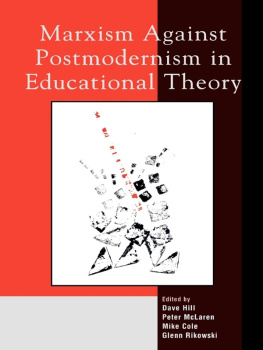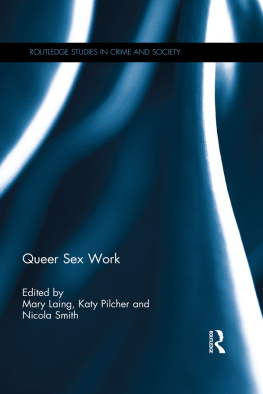
The Politics of Everybody
About the author
Holly Lewis is assistant professor of philosophy at Texas State University, where she teaches continental philosophy, economic and political philosophy, and aesthetics.
The Politics of Everybody
Feminism, Queer Theory, and Marxism at the Intersection
Holly Lewis

The Politics of Everybody: Feminism, Queer Theory, and Marxism at the Intersection was first published in 2016 by Zed Books Ltd, The Foundry, 17 Oval Way, London SE11 5RR, UK.
This ebook edition was first published in 2016
www.zedbooks.co.uk
Copyright Holly Lewis 2016
The right of Holly Lewis to be identified as the author of this work has been asserted by her in accordance with the Copyright, Designs and Patents Act 1988.
Typeset in Adobe Garamond Pro by seagulls.net
Index: John Barker
Cover designed by Dougal Burgess
All rights reserved. No part of this publication may be reproduced, stored in a retrieval system or transmitted in any form or by any means, electronic, mechanical, photocopying or otherwise, without the prior permission of Zed Books Ltd.
A catalogue record for this book is available from the British Library.
ISBN 978-1-78360-288-9 hb
ISBN 978-1-78360-287-2 pb
ISBN 978-1-78360-289-6 pdf
ISBN 978-1-78360-290-2 epub
ISBN 978-1-78360-291-9 mobi
Contents
In loving memory of Daniel Lewis
Acknowledgements
My thoughts on gender and sexuality began to take real shape when I co-taught the course Trans: Dangerous Border Violations in 2004 with Sandy Stone, whose brilliance, warmth, and openness have been an inspiration to me since. I must thank Wolfgang Schirmacher for encouraging me despite the fact (or maybe because of the fact) that I was a rather unconventional graduate student. My doctoral work has little to do with this book; however, Alain Badious comments have stayed with me: his insistence that amorous subjects and political subjects pursue separate truths helped me distinguish the productive tensions from the irrelevant bluster in queer politics.
This book would not have been possible without the support of the Department of Philosophy at Texas State University. I am incredibly fortunate to have worked under two particularly talented chairs, Vincent Luizzi and Craig Hanks. I thank Beverly Pairett, Camrie Pipper, and my graduate teaching assistants in the Applied Philosophy and Ethics Program for their helpfulness over the years.
Kika Sroka-Miller approached me about writing a book in late 2012. I am grateful that she and Zed Books continued to take me seriously after I decided to write something called The Politics of Everybody . I must also give thanks to my mystery reviewers for their insightful remarks, and to my patient copyeditor, Judith Forshaw.
Many of the books key arguments were presented over the years at the Historical Materialism Conference in London. Though they might not know it, comments made by Alan Sears, Abigail Bakan, Kevin Floyd, Paul Reynolds, and Nat Raha were instructive. And thanks to Ahmed Shawki for helping me get there.
This book is a product of many long nights of debate. I have taken so much over the years from discussions with Snehal Shingavi, Karen Dominguez Burke, Katie Feyh, Tithi Bhattacharya, Sarah Wolf, Dana Cloud, Jason Netek, Jamie Saunders, Sharon Smith, Nikeeta Slade, and Sherry Wolf.
People dont get to spend years with their face shoved in a computer without help from family and friends. I thank my mother, Penelope Lewis, for doing all those invisible things for so many years that mothers do, and my friends Damian Pring, Hache Buller, Caitlin Lowell, Erik Allesee, and Angela Smith. Also, I want to thank Cindy Beringer for just being, you know, Cindy. It would take an entire separate book to properly thank my beloved partner in crime, Bug Davidson.
My father, Daniel Lewis, passed away soon after I finished the outline for the book. In addition to being a devoted father, he was deeply committed to fighting racism and taught me to never cross a picket line. You really cant ask for more than that. This book is dedicated to him.
Introduction
I. The politics of everybody
The word everybody is politically unsettling. It evokes harmony and erasure, connectedness and enchainment; everybody is everywhere but nowhere in particular; the fact of everybody is inconceivable yet certain; everybody is an ever-changing limit. Everybody is both the us and the them. These days, the idea of everybody is most often used to mystify social relations. Phrases such as were all in this together, one big happy family and be a team player reflect this. But the idea can also inspire us to demand our inclusion in their world; it reminds us that we are the ones who make their world possible which of course means the world was always all of ours all along. (Of course, most of them find this sort of thinking threatening.) This book doesnt claim that there is a political philosophy or practice called the politics of everybody, let alone that I am some sort of visionary here to impart the one true version of that politics. The title simply makes the point that the word everybody is politically provocative. It is particularly provocative because we live in an age where the way we produce things the mode of production called capitalism requires ideological individualism. One term for trying to think beyond individualism has been, historically speaking, the idea of the totality. But totality has many connotations that the word everybody does not. Totality connotes stasis, structure, permanence, and closure. Totality is difficult to reconcile with movement and historical change. The word everybody, on the other hand, is a little less ambitious, a little more material, and it makes a little more room for the interpersonal.
After the Copernican revolution, humans have had to accept that were not the center of the universe; were just a contingent collective floating in space, stuck together on the same planet. Economic expansion reduces the experience of distance; technologies developed to facilitate the circulation of commodities bring us closer to one another whether we like it or not. In the age of global warming and digital satellites, it is no longer reasonable to imagine the world as a collection of territories with distinct boundaries. However, neither is it reasonable to envision the world as an unbounded multitude that has shed all borders, states, and limits: along with the unprecedented movement of bodies and goods, migrant labor, families fleeing war, prisoners, and former felons, perhaps more than ever, are at once adrift and stuck in place.
The cataclysmic ecological threat posed by the capitalist mode of production (the mindless pace it requires, the inevitable waste created in its boom and bust cycles) threatens everyone and requires real solutions. But genuine solutions require the interruption of profit extraction and must be applied at the point of production. For the few who benefit from this system of production the industrial capitalists, and the financial capitalists who help them spin their profits into wild fictions protecting the system from criticism is itself a matter of survival. The capitalist mode of production cannot be faulted. When climate change is not denied outright, at least the blame can be shifted. Environmental devastation becomes everybodys fault, and the critical eye is turned toward the consumer. Suddenly, the problem is no longer political; now it is ethical. The word everybody here operates as a diversionary tactic so that capitalist processes dont come under scrutiny. faceless masses, other peoples kids, other peoples nations, other peoples religions) combined with a sense of collective ownership of other peoples achievements (multiculturalism). Everybody exists to sacrifice for the few.
Next page
